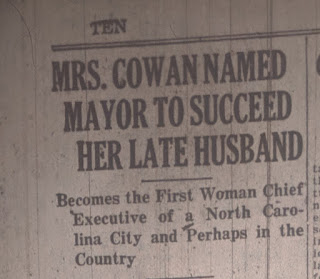I recently gave a tour at Wilmington's historic Oakdale Cemetery, with a focus on some of the women who were laid to rest there.
In the course of my research, I ran across the story of Katherine Mayo Cowan, who was mayor of Wilmington in the 1920s. And I wanted to know more about her.
Katherine was born in 1883. Her father was a machinist. She worked as a stenographer as a young, single woman. Katherine married James Hill Cowan in June, 1904. The newspaper at the time said that he was a "popular and polished" young man and that she was "the charming daughter of Mr. and Mrs. William E. Mayo." The pair were married in secret after a short engagement.
Katherine was born in 1883. Her father was a machinist. She worked as a stenographer as a young, single woman. Katherine married James Hill Cowan in June, 1904. The newspaper at the time said that he was a "popular and polished" young man and that she was "the charming daughter of Mr. and Mrs. William E. Mayo." The pair were married in secret after a short engagement.
Mr. Cowan is
the reason Mrs. Cowan was mayor. Mr. Cowan had a varied work life: he had been a newspaper editor, an actor, a show business promoter, Wilmington's Collector of Customs, and he worked at the Chamber of Commerce before he became mayor in 1921. He was inaugurated in front of an "immense throng" of people (Wilmington Dispatch, May 18, 1921). He died
in office in 1924, and his widow, Katherine, was appointed to fill his term.
 |
| Wilmington Morning Star, September 19, 1924 |
 |
| Wilmington Morning Star, September 22, 1924 |
After she was appointed mayor, Mrs. Cowan told reporters that she would "...do everything in my power to make this administration a success." (Wilmington Morning Star, September 23, 1924.). The newspaper went on to report on Mrs. Cowan's looks and demeanor: "Seated at the broad desk of her late husband, Mayor Cowan presented the appearance of being an altogether capable executive. She was becomingly clad in a black dress, her hair caught in the position one has grown to expect of the modern business woman and wore a pair of horn-rimmed glasses." No known photograph exists from this era, so we don't know what the paper meant by these comments. It seems telling, however, that when the next mayor of Wilmington took the reins of office, the newspaper did not feel the need to talk about his hairstyle or clothing choices. The paper did see fit to remark that "the Mayor's gavel of authority passed back into masculine hands...." (Wilmington Morning Star, June 2, 1925)
Mrs. Cowan seemed to enjoy being mayor. She ran for her own term. She announced her candidacy in March of 1925, but, paradoxically, did not actively campaign for office. Ideas about respectability held a powerful hold over women's lives and actions, and it may be that Mrs. Cowan thought it would not be appropriate to campaign for office.
Mayor Cowan came in dead last in the 1925 election.
Over the course of the century, other local women followed Mayor Cowan's footsteps and held public office. In the 1960s, Hannah Block elected Wilmington City Council from 1961-1963, and held the position of mayor pro tempore.
 |
| Hannah Block materials from Cape Fear Museum collection |
In 1972, Vivian S. Wright became the first woman elected to the New Hanover County Board of Commissioners. The first black woman to run for city council, Augusta Mosely Cooper, ran in the late 1960s. Lethia Hankins served on the City Council in the 21st century.
 |
| Campaign materials (Wright, 1972, Cooper, 1969, Hankins, 2003) |

